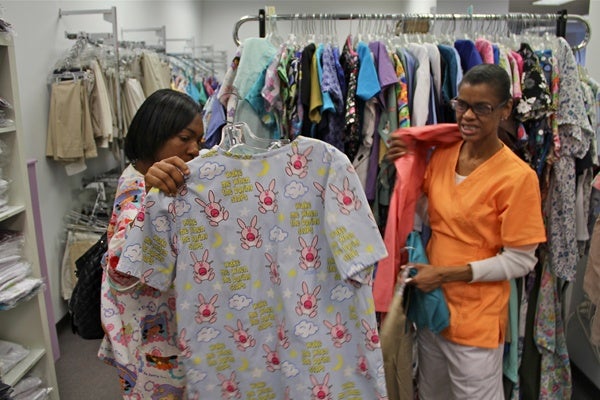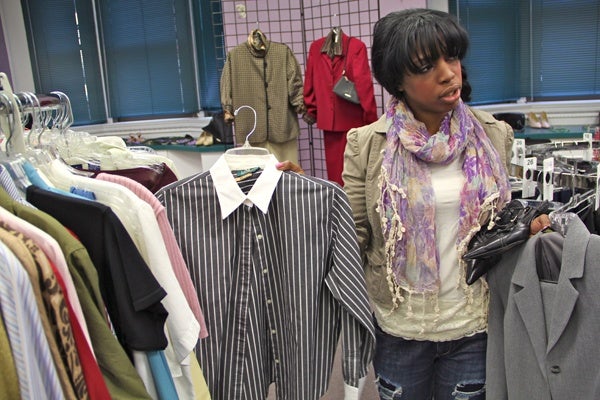Not learning a trade, but still gaining skills for the workplace
It’s a truism that the job search is all about details: the correctly punctuated email, and the firm handshake.
However, for some, those details come less easily. A large part of so-called “workforce development” involves working with job-seekers on the basics.
Khalilah Abdul-Jabar has filled a white shopping bag at non-profit Career Wardrobe. She has black slacks, a long blazer, a blue blouse, and a black pocketbook.
Abdul-Jabar is petite, wears a dark blue headscarf and jeans. The outfit is for a job interview on Friday for a clerical position at a swim club.
“I don’t know what I would have worn if I didn’t come here today,” she said. “I have jeans and a bunch of shirts. I have absolutely nothing for an interview.”
Her plight is a common one for those who come in the doors of Career Wardrobe in Center City, Philadelphia. The group’s office looks like a department story shrunk to the size of a 7/11. In some cases, director Sheri Cole says she provides client with an interview outfit — or in others, with everyday-wear, like scrubs. The racks of clothes have been donated or purchased and include extra-large sizes, which Cole says can be difficult for women to find.
“I always start my dressing appointments with what’s your favorite color, because I think more important than anything is: do you feel good?” says Cole. “Then you’re going to look good and you’re going to present yourself better.”
Many of the women Cole works with have a minimal job history. Some have never worked in a professional setting. Particularly if they come from low-income areas, she explains many of the women may not know someone who has worked in an office.
That can lead to some everyday problems. Case-workers tell Cole about women who show up to interviews in their Sunday best.
“That’s [often] something with sequins and a hat, not professional,” explains Cole.
Cole’s operation to provide women with image counseling and a well-tailored outfit is a pretty typical program. Another organization around the corner has a rack of suits for young men. Pennsylvania funds the “PA Workwear Program” throughout the state.
Different programs target different demographics with their required assistance.
Cheerful 20-year-old, Maurice Furman, joined a work-release program offered by a nonprofit in cooperation with the correctional system. It includes instruction in a variety of what the workforce industry calls “soft” job skills. That includes dressing for work, but also writing resumes and how to interview.
Furman slips effortlessly into this mode with a reporter.
“Eye contact, like how I’m sitting in my job-readiness shape,” said Furman. “I’m not slouching in the chair, they teach you stuff like that – like just be more work, just have that work experience in you, embedded in you.”
One of the key things for former inmates is how to handle the critical question about their criminal record. Participants in Furman’s program, offered by Resources for Human Development, say this question can make them start sweating. Professionals in the field tell job-seekers to stress the “since-then” — as in, since going to prison, the job-seeker completed vocational training or earned a certification.
This polishing work can include incorporate unusual strategies. Toni Morris runs a program directed at women coming out of prison. She recalls one women who she’d given a tape recorder to sit down with at night.
“To just talk about anything, and just try to learn now to stop staying ‘you know’ or ‘like,'” recalls Morris. “I gave her key words not to say — to stay away from.”
Financially, while most of these job programs are operated by non-profits, the government is their major funder. Funding for the program Furman attended ends in July. Administrator, Jennifer Arthur-Lewis says she’s struggling to maintain it.
“We are very diligent about knocking on doors, even when the doors are closed,” says Arthur-Lewis. “Do I believe this is something that we’d be able to hopefully [save and] breathe afterward? I can’t answer that.”
Funding for Pennsylvania’s workwear programs got zeroed out last year. Sheri Cole from Career Wardrobe says it got reinstated in part because she could show the state hard numbers on the program’s outcomes: in higher confidence and career achievement in women who attended her training and dressing sessions.
She sends her surveys to former clients by email — to reinforce one more soft skills lesson.
“Checking email is very important,” stressed Cole. “If you’re not checking your email regularly, if you’re not in that habit, it’s hard – you’re already setting yourself apart and potentially missing some opportunities.”
She says advisers provide one more overlooked service, talking with clients about their online appearance — how potential employers could react to what they find on websites and Facebook profiles.
WHYY is your source for fact-based, in-depth journalism and information. As a nonprofit organization, we rely on financial support from readers like you. Please give today.













